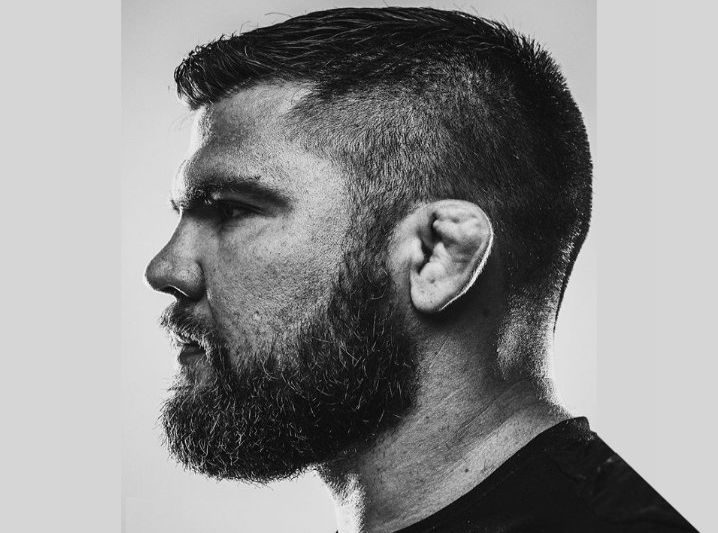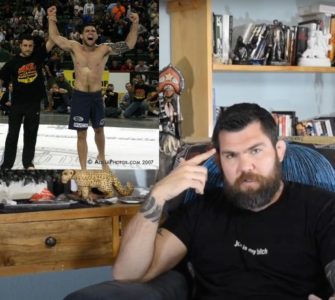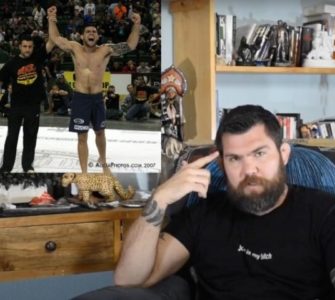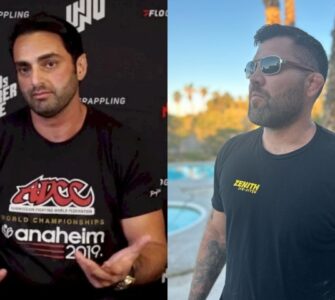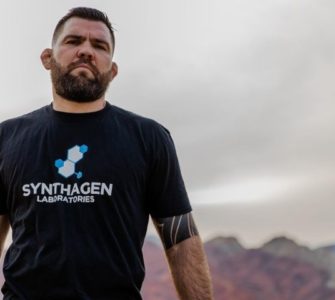photocred @scorsato
A black belt under Leonardo Vieira and a head coach of the powerful Zenith BJJ Team, Robert Drysdale is regarded as one of the top American grapplers of his generation and is one of the rare competitors that have beaten Marcelo Garcia.
In our interview, he spoke about his ultimate mindset prior and during the legendary ADCC 2007, gave his advice for those who want to go to Brazil in order to train there, and elaborated on the importance of having a clear “why” in your BJJ journey.
BJJEE: Robert, it is a pleasure of ours to be interviewing you. You are one of the BJJ’s „quiet legends“, having won some very impressive matches against formidable opponents and obtaining important titles. You have, consequently, been named as one of the most accomplished American grapplers ever – and quite possibly, the most accomplished one of your generation.
But, prior to that, it could be said that you’ve been a latecomer to Jiu Jitsu – since you have started training at 17 years of age.
How did you end up „finding“ BJJ and what made you fall in love with it?
Robert: I believe I found BJJ – or, better yet, that BJJ found me – at the right time in my life.
To understand what I mean by this, I need to say that, although I am a believer in starting children young in BJJ, I’m still not a believer in pushing them competitively at a young age. Children often compete because they are being pushed to do so by their parents and that is a very short-lived type of motivation. It is for that reason I believe that teenagers are the key demographic for BJJ; since at that age they are in the gym because they choose to be there.
For this and other reasons, I believe that BJJ came into my life at the right moment, when I was 17 years old. And as for the reasons I fell in love with it, I believe they are too many to enumerate, but I’ll do my best to mention a couple of the most important ones.
First off, I have always been attracted to combat and I believe this is an innate trait of mine that influenced my Jiu Jitsu journey. Secondly, I am fascinated by the strategy and technique that go behind BJJ. I know I am biased to say this, but BJJ certainly is one of the most complex forms of body expression out there, as the possibilities in it are endless… Add to that the physiological and psychological elements of the art and you have something extremely complex in front of you.
I guess that those were the immediate reasons so as to why I was drawn to BJJ. But, more importantly, it satisfied a deep seeded need of mine to find fulfillment and meaning in life. Brazilian Jiu Jitsu gave me meaning and kept me focused on the task at hand, so much so that it was as if the rest of the world had been shut down and there was nothing but me and the mats. It is a beautiful place to be a part of and live in.
BJJEE: So, Jiu Jitsu had found you at just the right time – and did so in Brazil, where you started training. And, even though you were born in the USA, you spent much of your childhood and teenage years in Brazil; and it was only when you came to the USA again, to pursue your academic studies in Las Vegas, that you were truly recognized for your grappling potential, right?
Robert: Yes, I found BJJ in Brazil. But after finishing high-school, I moved to Las Vegas, where my American family lived, in order to go to college. At the time (circa 2000), BJJ in the US was still in its infancy.
I ended up training there a lot more than studying though, and two years later I decided that I would go back to Brazil so I could invest into my BJJ career. And it was around this time that I met Steve da Silva, as well as others, who helped me a lot to start believing in myself.
BJJEE: And this heightened sense of belief in yourself has led to you amounting great successes at tournaments, as well as to you ultimately ending up training with Leonardo Vieira, from whom you’ve received your black belt.
Could you please tell us a bit more about what made you decide to start pursuing BJJ „full time“? What were your training experiences like during your „coming up“ period, prior to you getting your black belt?
Robert: Looking back, it all seemed a little reckless to be honest. I didn’t really care about the consequences of not succeeding… In fact, I wasn’t even thinking of success or rewards. I was simply immersed in the moment and nothing else mattered.
It’s hard to explain that feeling. Going to the gym and trying to beat everyone was as natural as waking up in the morning, eating and sleeping. There was never a question in my head, or an excuse, so as to whether I should go to the gym or not. I can’t even call it discipline, since discipline is doing something you dislike because you have to do it, like running sprints uphill for example. It was something beyond discipline itself… As I mentioned before, it was a beautiful place for me.
BJJEE: So, it was a beautiful place to be a part of. And we are certain that a number of our readers would absolutely love to experience that beauty as well, doing so by actually traveling and training Jiu Jitsu in Brazil.
What would you advise those of them that are lucky enough to go? What should they focus on in order to get as much as possible out of that experience?
Robert: I strongly recommend living the culture. Not visiting as a tourist, but to immerse yourself in the culture and to detach yourself from your own set of beliefs and values. You should learn the language, learn their sense of humor and listen to their music.
To me, all these things are parts of the journey, it’s not just about learning new moves. BJJ makes more sense as an art when you understand Brazilian culture and their psyche.
BJJEE: And how about all those stories that speak of the rivalry between schools back in the day in Brazil, about the rivalry with Luta Livre… Do you remember any of them?
Robert: I believe that I started training at the end of an era. The “dojo storming” days were over and the “pit-boy” days were gone too. I actually consider myself more a part of the generation of “professional competitors.”
I mean, I would hear about the rivalry with Luta Livre or the rivalry between schools, about the fights in the streets and so on. But to be honest, I never experienced any of that. They were stories of a past I didn’t experience. And I was in the competition mode pretty much from the very start.
BJJEE: Thank you. So you’ve been a part of a beautiful place for certain, but as all places have their own sets of hardships, yours must’ve had its own share as well… What would you say were some of the hardships on your BJJ journey?
Robert: There were the injuries I ignored and the losses that strengthened me. Also, there was dealing with the pettiness, with greed, with the ambition and the misguided motivation of people around me that wore me out a little.
The technical challenges were exciting, to be honest. Even the losses, looking back, were crucial for my development.
There were people as well, of course, in terms of cultural shocks. Primarily, however, there were conflicts of values… The professionalization of BJJ has made the new culture around it less appealing to me.
For example, there is the Japanese matrix that goes along the lines of: “Thank you, Sensei, for instructing me on my journey and for sharing your knowledge and experience with us”, which is gradually being replaced with: “Sensei, what are you going to give me so I continue to represent your team? I won a few tournaments you know…” This new set of values is at odds with BJJ’s core values. For me at least.
BJJEE: And do you think that there are any differences in regards to values between the BJJ scene in Brazil versus the one in the USA?
Robert: In the US, as opposed to Brazil, BJJ is a business above all. It is a very different approach.
BJJEE: Thank you, Robert. Now, shifting the focus a little bit back to your successes: your name is often associated with your famous ADCC 2007 winning streak and title in the absolute division. You’ve beaten the legendary Marcelo Garcia in the final match via the Darce choke, but you’ve also beaten other formidable opponents on the way to the finals – such as Andre Galvao in the semi-finals.
We’d love to hear more about your perspective on that tournament. How did it „feel like“? What was your mentality like, going against all those big names? Please tell us more.
Robert: I remember well the way I felt leading up to that tournament, during the training sessions. I remember a good friend of mine saying, after we rolled, that he’d be surprised if I didn’t win, which gave me enormous confidence. I was on fire in the gym – months would literally go by and no one could score a single point on me in practice. I just felt great.
So, I walked into the open division with a very relaxed mindset, without any pressure. I usually tend to put a lot of pressure on myself when I compete, but that day I felt none.
I remember the final match well… I was smiling before the match and one of my friends told me to stop smiling and focus. I told him that I was smiling because, in my head, I had already won and I was celebrating.
Simply, that day I felt like I was “in the zone”, as some athletes describe the feeling. Your body and mind get into this perfect synchrony with each other and everything just works… I’ve only felt like that a few times in my career. It is the perfect mindset for fighting and you can’t force it.
BJJEE: And that feeling of being “in the zone” had spilled to other BJJ-related areas of your life. Namely, you’ve started coaching grappling classes in 2007; and, soon after that, you’ve opened up your very own Academy.
You have a lot of experience as a coach. What would you say is the thing that will separate those who will truly get to “understand” Jiu Jitsu from those who never will?
Robert: People tend to focus a lot on physical and mental talents. Those are unquestionable, of course… However, they are non-idealistic and cynical – in ways that they reinforce that some of us have superior physical and mental traits compared to others.
I mean, sure, we aren’t clones and we differ dramatically psychologically and physically between each other. But there is something more important that both sides of this argument often ignore.
Namely, that is the “why”. Why do you do BJJ and what does it mean for you? It is an important question, but most competitors can’t give you a straight answer. And the reason for that is because they’ve never given it enough thought.
I only came to understand my own reasons after retirement, by looking back on my career. Many competitors want to win because they have their eyes on the reward – whether it is prestige, money, notoriety… But those are the same athletes whose motivation is short-lived because they are feeding off of external motives. Having pure motivations will drive you longer in my opinion, because your motives are now internal. The best competitors compete because they have something to prove to themselves. Sure, some may disagree on this, but it is just my opinion.
BJJEE: We completely agree: self-driven motivation will always outlast the external one.
And, in relation to that, what would you say that a self-motivated white belt should focus on in order to reach his blue belt? What advice would you give him/her?
Robert: I’d tell them not to think about the belt, the trophy or anything of that sort. Instead, you should focus on the immediate challenges in front of you, like tapping all the blue belts in the gym… Then the purples and so on. Focus on improving yourself. Everything else is a consequence.
BJJEE: So, it will all come to fruition if the motivation and focus of a jiujiteiro is placed in the right spot – towards himself/herself.
Thank you for the amazing insights, Robert. To end this interview, we’d also like to know: do you have a funny story or a favorite memory from all those times on the mats that you’d like to share with our readers?
Robert: I have plenty of good ones. But, just off the top of my head – I was notorious in my competitor days for being able to sleep before and after a match. I remember that, one time, I was laying in the bleachers and taking a nap when a total stranger woke me up because the referee and my opponent were waiting for me on the mats, calling my name on the microphone… Also, I once drove 7 hours for a competition and didn’t realize I had forgotten my gi until I got there… Actually, I did that twice (laughs).
BJJEE: Thank you, Robert. It has been our pleasure.
Robert: You are welcome and thank you!

